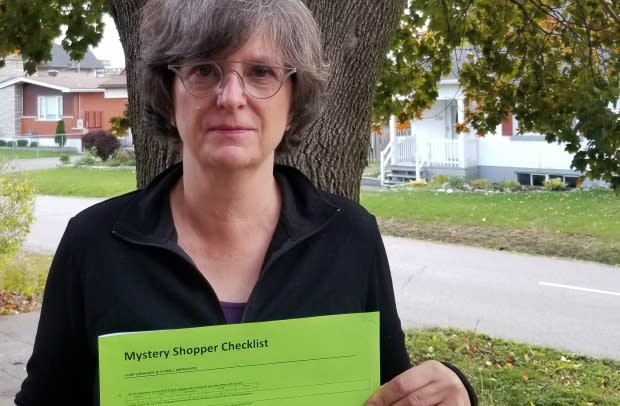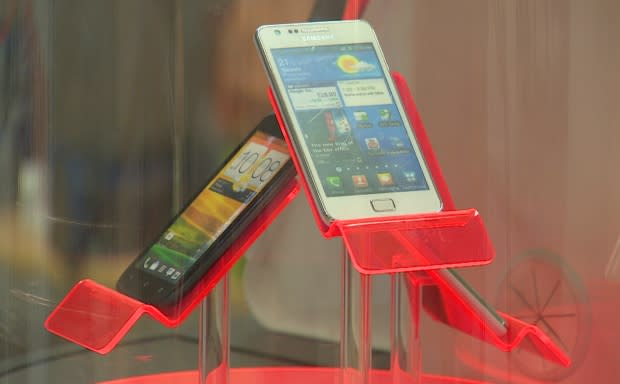Cellphone retailers fail mystery shopping test, researchers plan to tell CRTC inquiry
When Sean Grassie, Kristianne Anor and Tara Hristov headed to cellphone retailers in the Ottawa area recently, they weren't your average customers looking for a cellphone plan — they were University of Ottawa law students, on assignment as mystery shoppers.
Their mission? To test the consumer experience at the cellphone counter.
The students and the team's co-leader will present their "frustrating" findings today in Gatineau, Que., at a week-long CRTC public hearing into misleading and aggressive sales practices by Canada's telecom service providers.
The hearing is part of an inquiry the federal government ordered, after months of reporting on the issue by Go Public, which heard from more than 800 frustrated telecom customers and more than 200 current and former employees of the companies.
"The marketplace doesn't work well for consumers," says Mary Cavanagh, a professor at the University of Ottawa's Centre for Law, Technology and Society, "and we think the government is abdicating their responsibility if they don't deal with it."

The mystery shoppers made 36 visits to six major cellphone retailers in Ottawa and Gatineau testing to see how much information they'd be provided about buying a cellphone and a service plan — such as price, data limits and cancellation fees — and whether they'd be given any written material to take away for review.
"People are not getting enough information to make an informed decision," Cavanagh told Go Public.
'No consistency'
The mystery shoppers began their research in the summer of 2016, visiting six major retailers to test what would happen when they inquired about purchasing a cellphone service plan.
The shoppers visited two different locations for each retailer, armed with a checklist based on the Wireless Code — designed to empower and inform consumers.
They repeated that test in the summer of 2018, and added a second test — asking about buying a cellphone along with a service plan.
"We found virtually no consistency," says Cavanagh, "in either the information topics covered, or in the quality of the information that was conveyed."
Out of 36 visits, only once did an employee give clear, comprehensive and accurate information to the mystery shoppers.
The checklist
As soon as the mystery shoppers left each retailer — sometimes a store, sometimes a kiosk in a mall — they would fill out a 16-page checklist of over 100 questions.
Here are some of the questions on the checklist:
Did the salesperson speak clearly?
Did the salesperson ask enough questions to identify your needs?
Did the salesperson explain overage charges?
Did the salesperson explain how a contract can be cancelled?
Did the salesperson discuss what would happen if the device was lost or stolen?
More than 50 per cent of the time, topics from the checklist were never mentioned, despite prompts by the shoppers themselves and employees from all six retailers repeatedly gave poor or incorrect information.
The burden should not be on the consumer to ask all the smart questions. - Mary Cavanagh, university prof
"The information was completely lacking," says Cavanagh.
"You should be telling me about warranties. You should be telling me about extensions, about what happens after an offer terminates. The burden should not be on the consumer to ask all the smart questions."
The group's research findings also noted that there was "very little use of followup questions to put a customer's needs into context," that many of the interactions seemed "rushed even when they were the only customers in the kiosk" and that staff provided only "minimal responses" to questions.
Employees not helpful
Besides the checklist, the mystery shoppers made written observations about what happened, immediately after leaving a cellphone provider's store or kiosk.
In one instance, a mystery shopper noted, "When we asked for something in writing, she [the employee] said she did not have anything to give us and could not print from the computer, so she wrote out some basics on a sticky note and gave that to us."
On another visit, an employee told a mystery shopper that they could "take a picture of a piece of paper on the wall," that had some pertinent details.
One mystery shopper writes that another employee "just handed me the brochure and then stared at me after each question."
'Something in writing' needed
Not one visit resulted in a mystery shopper leaving with detailed information in writing.
The research paper says the mystery shoppers "observed a consistent reluctance and/or explicit denial of requests for written information or documentation that a customer could take away with them."

"It's completely unfair to consumers," says Cavanagh. "We know that people are very poor at retaining complex information that's only delivered verbally."
At the CRTC hearing, Cavanagh and her students will be urging the regulator to introduce rules making it mandatory for cellphone retailers to provide details in writing to potential customers.
"What are they [telcos] afraid of?" says Cavanagh. "What's at risk for them in providing a more robust package of information? It's needed to make what is called an informed decision."
'Hide the pamphlets'
Anuj Taxali says he was deliberately instructed not to help customers make an informed decision when he worked in a retail cellphone store several years ago.
In his written submission to the CRTC — and in an earlier Go Public story — Taxali said that in 2014 he briefly worked at a Toronto cellphone store that was frequented by senior citizens.
Although they were just looking for a low cost "pay as you go" plan, Taxali writes that his manager "told us to hide the pamphlets" about that option.
"She told us to instead sell these customers more expensive ... plans with a large number of minutes and internet data," writes Taxali, "even though we genuinely believed these plans were not the most appropriate option for such customers."
Seniors struggle in retail stores
Taxali's allegations are disturbing to Wanda Morris, vice-president of advocacy for CARP, a national advocacy association for people over age 50.
"That is such an unethical practice," says Morris. "After working so hard to get less costly [cellphone] options for people that suit their needs, it's hard to hear about people being misled."
CARP is part of the Fair Communications Sales Coalition, a group that includes the National Pensioner Federation and the Public Interest Advocacy Centre (ACORN), which advocates for low income families.

The coalition is also making a presentation to the CRTC today, arguing that Canadians are being misled and coerced into signing up for products and services that they knowingly would never have purchased.
"We've certainly heard from people that they don't feel they're getting the full story when they go into a store," says Morris. "If they're shown anything to read at all, they're given print that's too small to read."
Mary Cavanagh is hoping the federal government is paying close attention to this week's hearing.
"Is this the kind of marketplace that they really want to support?" asks Cavanagh. "Is this a competitive marketplace that also supports consumers? I would say so far, not very well."
With files from Enza Uda
Submit your story ideas
Go Public is an investigative news segment on CBC-TV, radio and the web.
We tell your stories and hold the powers that be accountable.
We want to hear from people across the country with stories you want to make public.
Submit your story ideas at Go Public.

